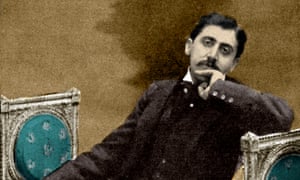I don’t keep diaries, so I don’t know the year, but some time in the late 1980s I was spending the summer in a borrowed flat in Edinburgh. I had finished an art degree, my friends had left the city and all the usual distractions had gone. I didn’t have much money and my social life was minimal. I ate samosas from the corner shop and walked everywhere. It was a self-willed isolation.
There were other things I could have done; got a job, been more active but I didn’t. I wanted to read Proust. As a child I read everything that came my way: CS Lewis’s Narnia books, Tolkien’s Lord of the Rings, Laura Ingalls Wilder’s Little House on the Prairie, Arthur Ransome, Ian Serraillier, Rosemary Sutcliff, Nina Bawden. But books are also habit, habits change, and as an adult, immersion in a book was a habit I had fallen out of. Yet when I picked up Remembrance of Things Past, the book worked on me in real time: its pace became my pace and my pace its pace. With a simple click of context, it became an experience.
My flat was at the top of a tenement with a view mainly of the air above the New Town: a good height for reading. From this vantage I lived for long stretches entirely in the sensual world of someone else and through July and into August, I stayed there, hooked into the looping, precise sentences, shot through with humour, digressions and observations that constantly brought new things into their orbit.
I haven’t gone back to Proust since and remember almost nothing of his cast of characters; friends, neighbours, lovers, or the constantshuttle of small events as they unfolded, but I remember being entirely held, and surprised by how held I was.
You could start on a passage and have no idea where it would end. Interior monologue flowed into exterior description and flooded back: the boundaries of consciousness seemed infinitely porous. You could halt on something relatively minor, your attention grabbed, and just as in life, stop there a while.
It was gripping and banal, charged and tedious all at the same time. I loved its slowed-down attentiveness, the insistence on the physicality of the world described through sight, sound and smell.
Evenings in Edinburgh in August are long, and reading it was a physiological experience that altered the ambience of the air, the way I inhabited the rooms, the divisions of my day. It felt as if my heart rate had changed.
But while I was reading, something else was going on. Damp had found its way into the three-way join between walls and ceiling,at the corner of my room and a fungus began to grow opposite the bed. As the place wasn’t in any way mine, I felt no pressure to do anything about it, and it seemed to point to something more wrong than I could deal with.
More flower than mushroom, over weeks it became the size of an overlarge flan, way bigger than my face, with alien yet flan-like features: a pale, creamy centre without blemish and a brown frill the colour of baked biscuit,around its rim.
I had never seen anything like it. It belonged with the exotics in the Botanic Garden, in the forest, in fiction, anywhere but in my bedroom. At night it was a dim rosette. Alongside the social world of the narrator and his circle – Swann, Odette, Albertine, Gilberte, the Baron de Charlus – the fungus grew in parallel, smooth and round.
Twice I intervened: once easing a knife beneath it, as you would a cake to loosen it. It would have come away easily but as it was such a perfect shape by then, I left it. Another time, at a particularly nervy point in the text, the mushroom got too troubling. I stood on a chair and threw handfuls of Vim at it. When I left the flat it was still there. Intact.
I could never hope to recreate that reading experience again. The structure of my life would not allow it. But more profoundly, neither would my powers of concentration. My brain has changed, and I do not read like that any more. It felt like a pure luxury, that book. Irrecoverable. When September came, things started to happen again and I had to pay attention to the outside world. I moved out and shortly after that, I left Scotland.

View all comments >